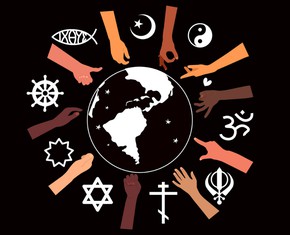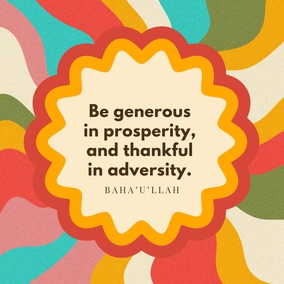The views expressed in our content reflect individual perspectives and do not represent the authoritative views of the Baha'i Faith.
In many cultures around the world, devotees of different Faiths worship together once a week—Muslims on Friday, Jews on Saturday, most Christians on Sunday. What about Baha’is?
The tradition of the Sabbath—that seventh day set aside for worship and rest each week—comes originally from the Biblical book of Genesis, the first book of the Hebrew Torah:
Thus the heavens and the earth were finished, and all the host of them.
And on the seventh day God ended his work which he had made; and he rested on the seventh day from all his work which he had made.
And God blessed the seventh day, and sanctified it: because that in it he had rested from all his work which God created and made. – Genesis 2:2-3.
In some early cultures, that seventh day observance included a feast—a banquet where attendees shared the bounty of good fortune with others.
Baha’is don’t celebrate a Sabbath day each week—instead, the Baha’is in every community gather together to worship and share hospitality and fellowship once every nineteen days, in a unique meeting called a Baha’i Feast:
As to the Nineteen Day Feast, it rejoiceth mind and heart. If this feast be held in the proper fashion, the friends will, once in nineteen days, find themselves spiritually restored, and endued with a power that is not of this world. – Abdu’l-Baha, Selections from the Writings of Abdu’l-Baha, p. 91.
The Baha’i Feast has three distinct parts:
- a devotional portion set aside for worship, prayers and readings from the holy writings;
- an administrative portion, where the community consults together about its activities;
- and a social portion, where Baha’is share food, music, conversation and laughter.
Abdu’l-Baha compared the nineteen-day Baha’i Feast to the Lord’s Supper, and advised everyone who attended to free their thoughts from “all else save God:”
… when the friends have the intention of entering in these meetings and assemblies, they must first make the purpose pure, disengage the heart from all other reflections, ask the inexhaustible divine confirmation and with the utmost devotion and humility set their feet in the gathering-place. …
Make ye an effort in every meeting that the Lord’s Supper may become realised and the heavenly food descend. This heavenly food is knowledge, understanding, faith, assurance, love, affinity, kindness, purity of purpose, attraction of hearts and the union of souls … – Abdu’l-Baha, Baha’i World Faith, pp. 407-408.
…when you present yourselves in the meetings, before entering them, free yourselves from all that you have in your heart, free your thoughts and your minds from all else save God, and speak to your heart. That all may make this a gathering of love, make it the cause of illumination, make it a gathering of attraction of the hearts, surround this gathering with Lights of the Supreme Concourse, so that you may be gathered together with utmost love. Each one of you must think how to make happy and pleased the other members … and each one must consider all those who are present as better and greater than himself, and each one must consider himself less than the rest. Know their station as high, and think of your own station as low. Should you act and live according to these behests; know verily and of a certainty, that such a Feast is indeed the Heavenly Food; that Supper is indeed the Lord’s Supper. – Abdu’l-Baha, Star of the West, Volume 3, p. 83.
Many local Baha’i communities around the world also have devotionals, meetings for prayer and reflection that anyone can attend. In those informal gatherings, people read and reflect on prayers and scriptures from all Faiths, not just the Baha’i teachings.
In a letter written by the Universal House of Justice in 1989, the Baha’i Feast is defined, not only as a worship service in the traditional sense, but as “a common institution of the people,” one of the basic building blocks of the new world order ordained by Baha’u’llah:
The Feast may well be seen in its unique combination of modes as the culmination of a great historic process in which primary elements of community life—acts of worship, of festivity and other forms of togetherness—over vast stretches of time have achieved a glorious convergence. The Nineteen Day Feast represents the new stage in this enlightened age to which the basic expression of community life has evolved. …
Moreover … the Feast becomes a link that connects the local community in a dynamic relationship with the entire structure of the [Baha’i] Administrative Order. But considered in its local sphere alone there is much to thrill and amaze the heart. Here it links the individual to the collective processes by which a society is built or restored. Here, for instance, the Feast is an arena of democracy at the very root of society, where the Local Spiritual Assembly and the members of the community meet on common ground, where individuals are free to offer their gifts of thought, whether as new ideas or constructive criticism, to the building processes of an advancing civilization. Thus it can be seen that aside from its spiritual significance, this common institution of the people combines an array of elemental social disciplines which educate its participants in the essentials of responsible citizenship. – The Universal House of Justice, To the Baha’is of the World, cited in A Wider Horizon, Selected Letters 1983-1992, pp. 67-68.
















Comments
Sign in or create an account
Continue with Googleor